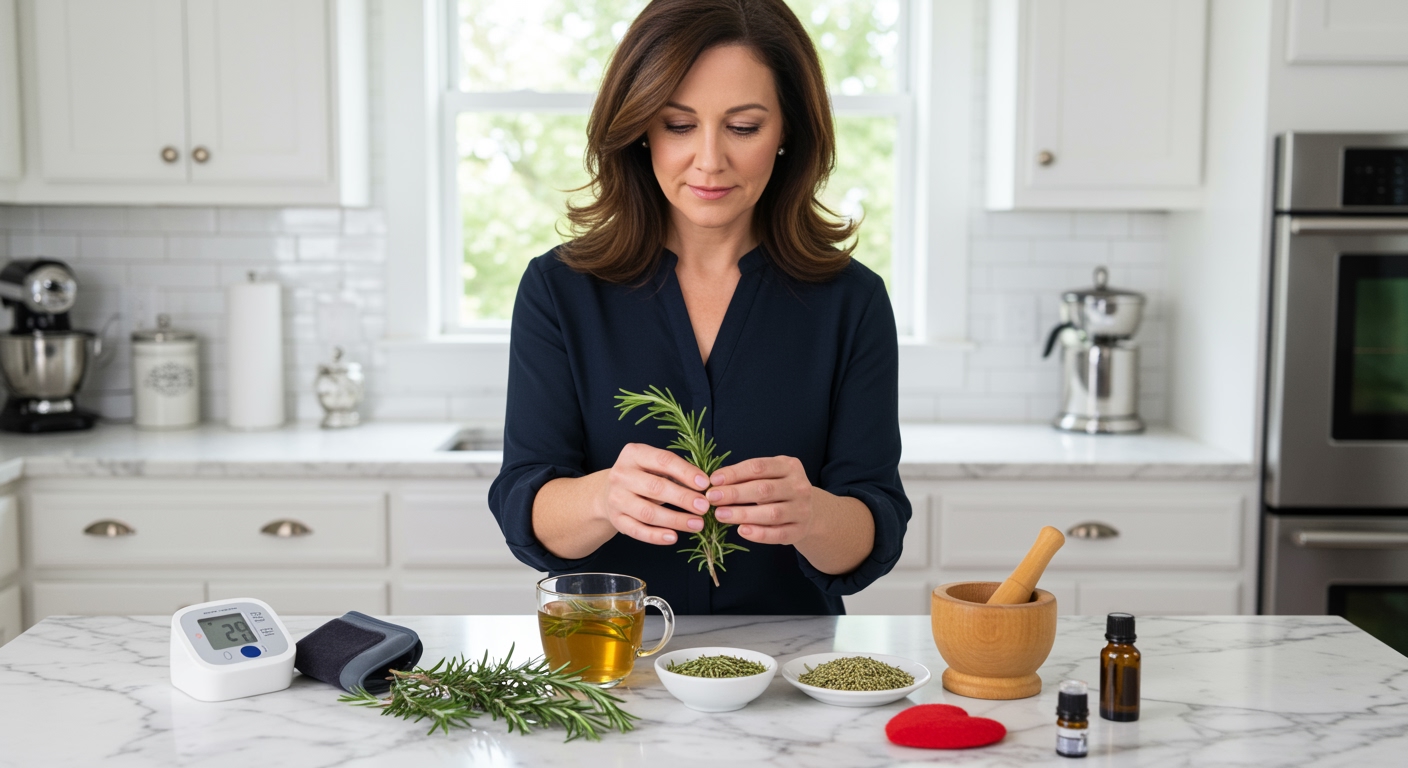✪ Key Takeaway: Rosemary may help low blood pressure through improved circulation, but effects vary and should complement medical treatment.
Introduction
Your doctor just told you that your blood pressure readings are consistently low, and now you are wondering if that fragrant rosemary sitting in your kitchen could actually help.
You might be asking this question because you have heard conflicting information about rosemary and blood pressure, or perhaps someone mentioned that herbs can support cardiovascular health naturally.
Hi, I am Abdur, your nutrition coach, and today I am going to explain exactly how rosemary affects low blood pressure and whether it can be part of your health management strategy.
What Exactly Is Low Blood Pressure?
Low blood pressure, medically known as hypotension, occurs when your blood pressure readings consistently fall below 90/60 mmHg.
Your heart pumps blood through your arteries with a certain force, and when this force becomes too weak, your organs may not receive adequate oxygen and nutrients.
Common symptoms include dizziness, fainting, fatigue, nausea, and difficulty concentrating, especially when you stand up quickly.
Several factors can cause low blood pressure, including dehydration, certain medications, heart problems, endocrine disorders, and severe infections.
Some people naturally have low blood pressure without any symptoms, which doctors consider normal for them.
However, when low blood pressure causes symptoms or develops suddenly, it requires medical attention and proper management strategies.
✪ Fact: Blood pressure naturally fluctuates throughout the day, typically lowest during sleep and highest in the morning.
How Does Rosemary Affect Your Cardiovascular System?
Rosemary contains powerful antioxidants called rosmarinic acid and carnosic acid that can influence your cardiovascular system in multiple ways.
These compounds help improve blood circulation by relaxing blood vessels and reducing inflammation throughout your vascular system.
Research shows that rosemary can stimulate your central nervous system, which may help increase heart rate and improve overall circulation.
The herb also contains compounds that may help strengthen your heart muscle and improve its pumping efficiency over time.
When you consume rosemary regularly, its active compounds enter your bloodstream and can help dilate your blood vessels, potentially supporting better blood flow.
However, the effects are generally mild and work best as part of a comprehensive approach to cardiovascular health rather than a standalone treatment.
✪ Pro Tip: Fresh rosemary contains higher levels of active compounds compared to dried versions, so use it whenever possible.
Can Rosemary Actually Raise Your Blood Pressure?
The relationship between rosemary and blood pressure is more complex than simply raising or lowering it.
Rosemary can have a mild stimulating effect on your cardiovascular system, which may help support normal blood pressure levels in people with hypotension.
The herb works by improving circulation and potentially increasing heart rate slightly, which can help your body maintain adequate blood pressure for proper organ function.
Studies suggest that rosemary may help regulate blood pressure by supporting healthy vascular function rather than dramatically changing pressure readings.
For people with low blood pressure, this gentle regulatory effect might provide some benefit, but the changes are typically modest and gradual.
The key is that rosemary appears to help your cardiovascular system function more efficiently rather than forcing dramatic changes in pressure levels.
✪ Note: Individual responses to rosemary vary significantly based on your current health status and sensitivity to herbs.
What Are The Best Ways To Use Rosemary For Low Blood Pressure?
The most effective way to use rosemary for potential blood pressure support is through regular, moderate consumption in your daily diet.
Fresh rosemary leaves can be added to soups, stews, roasted vegetables, and meat dishes to provide both flavor and potential health benefits.
Rosemary tea, made by steeping fresh or dried leaves in hot water for 5-10 minutes, offers another gentle way to consume the herb regularly.
You can also use rosemary-infused olive oil for cooking, which combines the benefits of both the herb and healthy monounsaturated fats.
Start with small amounts, such as one teaspoon of fresh rosemary or one cup of rosemary tea daily, and monitor how your body responds.
Consistency is more important than large doses, so aim for regular, moderate use rather than occasional high amounts of rosemary consumption.
✪ Pro Tip: Combine rosemary with other circulation-supporting foods like garlic and ginger for potentially enhanced benefits.
Are There Any Risks Or Precautions With Rosemary?
While rosemary is generally safe for most people when used in culinary amounts, there are important precautions to consider.
Large amounts of rosemary, particularly in supplement form, may cause stomach upset, kidney irritation, or allergic reactions in sensitive individuals.
People taking blood pressure medications should consult their healthcare provider before using rosemary therapeutically, as it might interact with certain medications.
Pregnant and breastfeeding women should avoid large amounts of rosemary beyond normal cooking quantities, as it may stimulate uterine contractions.
If you have epilepsy or seizure disorders, be cautious with rosemary, as large amounts might potentially trigger seizures in susceptible individuals.
Always start with small amounts and pay attention to how your body responds, discontinuing use if you experience any adverse reactions.
✪ Note: Culinary amounts of rosemary are typically safe, but therapeutic doses require medical supervision for people with health conditions.
The Bottom Line
Rosemary can potentially support people with low blood pressure through improved circulation and mild cardiovascular stimulation, but it should never replace proper medical treatment.
Small steps in the kitchen can lead to big changes in your health, but they work best when combined with professional medical care.
I would love to hear about your experiences with rosemary or any questions you might have about using herbs for blood pressure support, so please share your thoughts in the comments below.
References
At NutritionCrown, we use quality and credible sources to ensure our content is accurate and trustworthy. Below are the sources referenced in creating this article:
- Wildwood Health: Rosemary’s Health Benefits
- PubMed: Rosemary and Cardiovascular Health
- Sencha Tea Bar: Rosemary Tea Benefits





